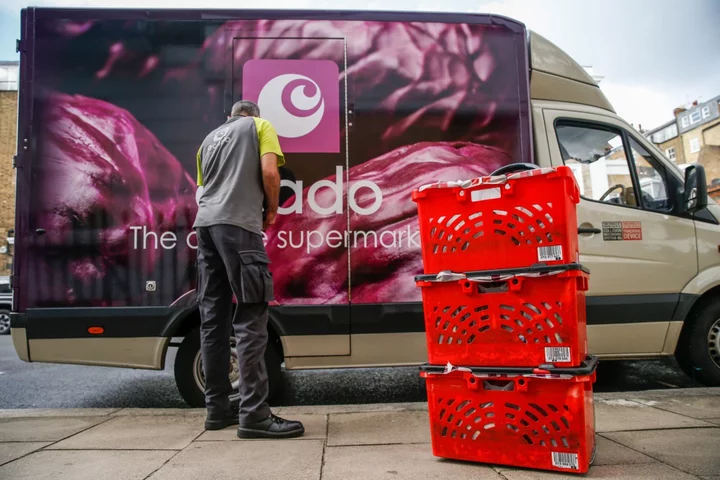Food inflation in Britain appears to be past its worst after producers and grocers cut prices and raw material costs stabilize or come down.
In the first sign that the country’s lengthy cost-of-living crisis could be easing, grocery price inflation dropped 1.6 percentage points to 14.9% in the four weeks to July 9, according to market research firm Kantar. That’s down from a high of 17.5% in March.
Food and drink manufacturers cut their prices in June for the first time in three years, according to Lloyds Banking Group.
The reduction will come as a relief for households struggling with their budgets, although there could still be a time lag before a positive effect is seen as rising interest rates continue to bump up mortgage costs and inflation remains more than four times its target at 8.7%.
Britain is “definitely over the worst” of food price inflation, according to Tim Steiner, CEO of online grocer Ocado Group Plc. Still, he warned Tuesday that until interest rates steady, there will be pressure on home loans and wage demands.
“We need to see interest rates ideally stabilize and come down before I think we can start to see this inflation actually start to go back down,” said the former Goldman Sachs Group Inc. banker.
Steiner said grocers haven’t been profiteering from inflation, an allegation made by some Members of Parliament.
“When there’s excess demand for toilet paper or water, the grocers ration it,” he said. “As opposed to when there’s more demand for taxis or theater tickets or airline tickets, they just put the price up and take the profit.”
Ocado has been reducing prices on more than 100 products from branded goods such as Lurpak garlic butter to salmon fillets and avocados. All the big grocers have been doing the same and frozen food specialist Iceland Foods announced price cuts Tuesday on 500 essential household products. Deals include £2 for 15-piece packs of fish fingers and £3.60 chicken-breast fillets.
The Kantar survey showed that more than a quarter of sales in the four-week period were made through promotions as shoppers try to save money. Retailers are shifting efforts from everyday low pricing, including on store-brand products, to loyalty programs such as Tesco Plc’s Clubcard or J Sainsbury Plc’s Nectar card.
The search for cheaper prices means discount grocer Aldi was again the fastest-expanding retailer, with sales up by 24%, while Lidl recorded a 22% annual jump in sales.
“Shoppers have dramatically changed their behavior to combat inflation, whether by trading down to cheaper products or visiting different grocers,” said Fraser McKevitt, head of retail and consumer insight at Kantar.
The average household has increased grocery spending by £330 ($432) over the last year, the data showed, significantly less that the £683 rise they would have suffered without changing their shopping habits.
Britain’s overall rate of inflation has remained stubbornly high this year. Economists expect it to dip to 8.2% on Wednesday, but the last four readings from the Office for National Statistics all exceeded forecasts.
Lloyds said it’s the first time manufacturers in the sector have cut their prices since February 2020. In May, they reported that their own input costs had slipped for the first time since 2016, a trend which continued in June as global food commodity prices fell by 1.4% over the month.
“This could be good news when it comes to the future direction of UK food price inflation,” said Annabel Finlay, managing director of food, drink and leisure at Lloyds Bank Commercial Banking. “But it will likely be some time before any positive effect is seen on the price consumers pay at the till.”
--With assistance from Lucy White, Maddie Parker and Jamie Nimmo.

